|
|
|
Sort Order |
|
|
|
Items / Page
|
|
|
|
|
|
|
| Srl | Item |
| 1 |
ID:
151008
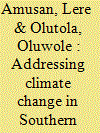

|
|
|
|
|
| Summary/Abstract |
Climate change is a global challenge. Its ramifying effects on both natural and human systems cut across different regions of the world. While Africa as a whole is being confirmed to be more affected by climate change due in part to a relatively low(er) mitigation and adaptive capacity, coupled with a situation where majority of its population depends mainly on natural resources, Southern Africa is singled out as a potentially vulnerable subregion for other additional factors. Representing a milestone in the trajectory of the global climate change process, the 21st session of the Conference of Parties (COP-21) resolved with a consensual climate change deal known as the Paris Agreement. The Agreement, through the instrumentality of a ratchet up mechanism, otherwise described as Intended Nationally Determined Contributions (INDCs), seeks significant cuts in greenhouse gas (GHG) emissions effectively from 2020. In essence, it calls for a novel though gradual shift from carbon-emission approach to low emission development strategy. This, no doubt, is indispensable to sustainable development at all levels. Beyond national commitments as obligatory for parties, there is a need for regional cooperative efforts which should bring about shared appropriate policy responses that promote green energy as well as seize opportunities inherent in it for national and deterritorialised gains. Adopting neoliberal and green theories, the institutional framework of the Southern Africa Development Community (SADC) where South Africa is expected to take a lead is examined in this article.
|
|
|
|
|
|
|
|
|
|
|
|
|
|
|
|
| 2 |
ID:
142281


|
|
|
|
|
| Summary/Abstract |
For many developing countries, the Paris agreement is better than no deal and an important step in the right direction.”
|
|
|
|
|
|
|
|
|
|
|
|
|
|
|
|
| 3 |
ID:
179734
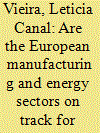

|
|
|
|
|
| Summary/Abstract |
The European Green Deal has established a 2050 net-zero emissions target to tackle climate change. The manufacturing and energy sectors account for at least 40% of European emissions and are central in the transition to a low-carbon economy. Thus, devising suitable strategies for reaching net-zero emissions requires a comprehensive analysis of emissions reductions achieved by the two sectors. This paper has a two-fold aim: firstly, to empirically analyse European energy and manufacturing facilities’ abatement results; secondly, to expose whether the two sectors are on track to achieve net-zero emissions by 2050. We used European Union Emissions Trading System data from 2005 to 2017 from France, Germany, Italy, Spain, and the United Kingdom to analyse the homogeneity of mitigation performances and the distribution of emissions among installations. The results indicate that a large share of installations have not decreased emissions yet, although there is substantial variety in units' contribution to total carbon releases. A smaller bundle of units (from 13 to 23%) containing super-polluters is responsible for up to 95% of emissions. The findings highlight that achieving net-zero emissions by 2050 will require additional policies that are tailored to super-polluters and also support installations that have not started their decarbonisation pathway.
|
|
|
|
|
|
|
|
|
|
|
|
|
|
|
|
| 4 |
ID:
163551


|
|
|
|
|
| Summary/Abstract |
Under the Paris Agreement, countries committed to a variety of climate actions, including post-2020 greenhouse gas (GHG) emissions reduction targets. This study compares projected GHG emissions in the G20 economies under current climate policies to those under the GHG targets outlined in the nationally determined contributions (NDCs). It is based on an assessment of official governmental estimates and independent national and global studies. The study concludes that six G20 members (China, India, Indonesia, Japan, Russia and Turkey) are projected to meet their unconditional NDC targets with current policies. Eight members (Argentina, Australia, Canada, the European Union, Republic of Korea, South Africa and the United States) require further action to achieve their targets. Insufficient information is available for Saudi Arabia, and emission projections for Brazil and Mexico are subject to considerable uncertainty. The study also presents high-level decarbonisation indicators to better understand the current progress towards meeting the NDCs – Saudi Arabia and South Africa were found to continue increasing both emission intensity per unit GDP and emissions per capita under current policies by 2030 from 2015 levels.
|
|
|
|
|
|
|
|
|
|
|
|
|
|
|
|
| 5 |
ID:
164867


|
|
|
|
|
| Summary/Abstract |
Backsliding on the Paris Agreement by the United States and others is steering the globe down a dangerous path toward runaway climate change.
|
|
|
|
|
|
|
|
|
|
|
|
|
|
|
|
| 6 |
ID:
168337
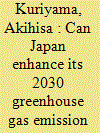

|
|
|
|
|
| Summary/Abstract |
This study investigates the stringency of Japan's greenhouse gas emissions reduction target for 2030 (nationally determined contribution: NDC), focusing on the macroeconomic assumptions of Kaya indicators and others previously overlooked, e.g. GDP per working-age population. It also conducts a decomposition analysis in light of historic political and economic events.
We find that the real GDP growth assumption underlying the NDC target is unrealistic. Namely, the real GDP per working-age population, which is an indicator of productivity, needs to be improved annually by 2.5% on average for 15 years, a high level that has not been observed since the collapse of the economic bubble in the early 1990s.
|
|
|
|
|
|
|
|
|
|
|
|
|
|
|
|
| 7 |
ID:
161252
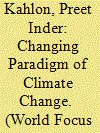

|
|
|
|
|
| Summary/Abstract |
Climate change, a scientific issue, has become a highly debatable and politically motivated issue in last three decades. The Kyoto protocol represents an important milestone in international efforts to address climate change. But it failed to catch up with the changes occurring at global level due to lack of clarity at policy level and division of globe into Annex I and Non-Annex I nations.
|
|
|
|
|
|
|
|
|
|
|
|
|
|
|
|
| 8 |
ID:
180142


|
|
|
|
|
| Summary/Abstract |
In 2016 and as part of its commitment under the 2015 Paris Agreement, China submitted its First Nationally Determined Contribution (NDC), outlining its ‘best efforts’ to limit greenhouse gas emissions. In 2017, the country accounted for 26% of global carbon emissions, stemming mostly from coal-based electricity generation and mining. The United States, by comparison, accounted for nearly 14%, and the European Union, almost 10%. In view of this disparity and the significance of China's contribution to achieving global emissions targets and sustainability, we revisit its First NDC. We argue that, while China is set to meet its non-fossil fuel targets, progress on its fossil fuel targets is stymied by continual coal development, which has negative implications for the Paris 2 °C limit. We contend that the country's focus on carbon-intensive economic expansion is a major barrier to greater climate ambition, especially when considering its growing portfolio of overseas investments in fossil fuel-dependent sectors. In bringing together disparate arguments from across the energy policy literature and looking ahead to its Second NDC, we conclude by making four recommendations for increasing China's climate ambition and centering a just transition to clean energy.
|
|
|
|
|
|
|
|
|
|
|
|
|
|
|
|
| 9 |
ID:
186443


|
|
|
|
|
| Summary/Abstract |
Carbon prices and carbon caps need to be set at levels that will deliver the reduction targets necessary to keep global warming under 2 °C, aspiring to 1.5 °C above pre-industrial levels, in line with the Paris Agreement. Given both the urgency of the situation and the heterogeneity across countries and sectors, switching caps and switching prices may be the answer.
|
|
|
|
|
|
|
|
|
|
|
|
|
|
|
|
| 10 |
ID:
151007


|
|
|
|
|
| Summary/Abstract |
The Paris Agreement on Climate Change was adopted at the close of the 21st Conference of Party on 12 December 2015. This agreement has been approved after a marathon negotiation in which parties under the aegis of the United Nations have finally agreed on the terms and conditions to implement it by 2020. The prime objective of the Paris Agreement is to ensure member states of the United Nations take appropriate and concrete actions in combating the menace of climate change that poses a challenging threat to humanity. It includes keeping temperature rise below 2°C by this century and limiting the temperature increase even further to 1.5°C above the pre-industrial levels. India has announced voluntary pledges during the conference which include carbon intensity growth by 33–35 per cent over the 2005 level, to raise the share of non-fossil fuel power to 40 per cent by 2030 and to produce 175 gigawatt (GW) of renewable power by 2022. Hence, the basic objective of this article is to examine India’s commitments and its initiatives to combat climate change in line with the Paris framework agreement to be implemented by 2020 and also to highlight the implications and drawbacks which India confronted.
|
|
|
|
|
|
|
|
|
|
|
|
|
|
|
|
| 11 |
ID:
166532
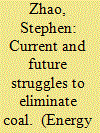

|
|
|
|
|
| Summary/Abstract |
Reductions in coal use necessary to meet the objective of keeping global temperature increase well under 2.0 °C faces serious political economic hurdles. To transition from coal, existing use must be eliminated and new growth in coal consumption must be stymied. Efforts to reduce existing consumption in a speedy manner faces challenges in domestically oriented markets where coal industry coalitions resist anti-coal policy and pursue industry protection. In addition, we identify a serious loophole in coal restraint exercised by a number of the users including: China, Japan and Korea. Continued support for coal capacity expansion abroad in both public and private sectors in these markets appears to reflect the lack of incentives, or sanctions in reining in such external capacity expansion. Such external expansion currently is not counted in nationally determined commitments for the Paris Agreement of the United Nations Framework Convention on Climate Change (Paris Agreement). Without greater national political efforts, the necessary reduction in coal use cannot be achieved.
|
|
|
|
|
|
|
|
|
|
|
|
|
|
|
|
| 12 |
ID:
186192


|
|
|
|
|
| Summary/Abstract |
How does naming and shaming affect public support for compliance with international agreements? We investigated this question by conducting survey experiments about the Paris Agreement, which relies on social pressure for enforcement. Our experiments, administered to national samples in the United States, produced three sets of findings. First, shaming by foreign countries shifted domestic public opinion in favor of compliance, increasing the political incentive to honor the Paris Agreement. Second, the effects of shaming varied with the behavior of the target. Shaming was more effective against partial compliers than against targets that took no action or honored their obligations completely. Moreover, even partial compliers managed to reduce the effects of shaming through the strategic use of counter-rhetoric. Third, identity moderated responses to shaming. Shaming by allies was not significantly more effective than shaming by non-allies, but Democrats were more receptive to shaming than Republicans. Overall, our experiments expose both the power and the limits of shaming as a strategy for enforcing the Paris Agreement. At the same time, they advance our understanding of the most significant environmental problem facing the planet.
|
|
|
|
|
|
|
|
|
|
|
|
|
|
|
|
| 13 |
ID:
167136


|
|
|
|
|
| Summary/Abstract |
Global climate governance still faces serious challenges despite the epochal Paris Agreement of 2015. Whether and how the world will reach the targeted 1.5-degree limit remains difficult to foresee, although undoubtedly one of the necessary conditions is greater cooperation among the major greenhouse gas (GHG) emitting nations. In this light, the decision by the USA, the second largest GHG emitter in the world, to withdraw from the Paris Agreement has significant global ramifications. Another source of uncertainty is the European Union’s climate policy, which has long been a role model for the world; it will likely have to undergo major changes as a result of the UK’s exit from the EU, which is projected to take place in 2019. Against this backdrop of profound geopolitical changes, this article argues that strengthened cooperation between the EU and China—the world’s largest GHG emitter, but also its largest investor in renewable energy and an increasingly vocal voice for climate action—is indispensable for meaningful climate change mitigation and adaptation in the decades ahead, even if the end results still fall short of the ambitions outlined in the Paris Agreement. Diverging economic and political interests still exist, but there is also much common interest and ample room for collaboration. We review the progress and challenges in EU-China cooperation on climate change and put forward practical suggestions for plausible future directions.
|
|
|
|
|
|
|
|
|
|
|
|
|
|
|
|
| 14 |
ID:
166980
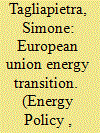

|
|
|
|
|
| Summary/Abstract |
Over the last decade, the EU has pursued a proactive climate policy and has integrated a significant amount of renewables into the energy system. These efforts have proved successful and continuing along this pathway, increasing renewables and improving energy efficiency, would not require substantial policy shifts. But the EU now needs a deeper energy transformation to decarbonise in line with the Paris agreement and to seize the economic and industrial opportunities offered by this global transformation. A full-fledged energy transition is becoming economically and technically feasible, and its cost would be similar to that of maintaining the existing system, if appropriate policies and regulations are put in place. In short, the EU could benefit from deep decarbonisation irrespective of what other economies around the world do. The transition can also be socially acceptable, if the right policies are put in place to control and mitigate the distributional effects of deeper decarbonisation. The time to act is now, as policy choices made up to 2024 will define the shape of the EU energy system by 2050. This article outlines the key priorities that, in our view, should drive the EU energy and climate policy making for the new institutional cycle 2019–2024.
|
|
|
|
|
|
|
|
|
|
|
|
|
|
|
|
| 15 |
ID:
171578


|
|
|
| 16 |
ID:
170835


|
|
|
|
|
| Summary/Abstract |
Combating climate change at a global scale requires dramatic
mobilization of capital markets. By 2035, more than $53 trillion will need to
be invested in energy supply and efficiency in order to achieve climate targets
laid out in the 2015 Paris Agreement. Interest and participation in sustainable
finance continues to grow: environmental, social, and governance (ESG)
investing assets under management totaled $30.7 trillion (of which $1 trillion is
specifically classified as sustainability-themed) at the start of 2018, representing
a 34% increase over the preceding two years. Yet, the capital that is available
for investment in sustainable assets may not be well-matched with the pipeline
of projects in search of financing. Green asset classes, including renewable
generation, infrastructure, energy efficiency, and clean transport, are often
inherently novel, small, and/or disaggregated. This makes them difficult and
expensive to combine into investment-ready formats, preventing capital from
being deployed on the timescale required to enable a quick energy transition.
Moreover, market barriers exist with respect to early-stage financing and proving
the viability of new markets and business models. In this article, we explore
the hurdles and barriers that financial actors must overcome to ensure efficient
capital matching that bridges the gap between climate awareness and meaningful
climate investment
|
|
|
|
|
|
|
|
|
|
|
|
|
|
|
|
| 17 |
ID:
180238


|
|
|
|
|
| Summary/Abstract |
Anthropogenic climate change has emerged as the most disruptive socio-political issue in the last few decades. The Kyoto Protocol’s failure to curb the rising greenhouse gases emissions pushed the UNFCCC-led negotiations towards a more flexible, non-binding agreement at the Paris COP21 meeting in 2015. The Paris Agreement’s hybrid approach to climate change governance, where flexible measures like the nationally determined commitments are balanced against the ambition of limiting the global temperature within the two-degree range, ensured the emergence of an increasingly complex and multi-stakeholder climate change regime. The article outlines the roadmap of the transition from the top-down approach of Kyoto Protocol to the legally non-binding, bottom-up approaches adopted for the post-Paris phase. The article outlines the post-Paris developments in international climate politics, which hold long-term geopolitical and geoeconomic implications. The article focuses on the fundamental shifts and balances within the UNFCCC architecture and examines the four fundamental features of this transition—the interpretation of differentiation and common but differentiated responsibilities, the evolving role of emerging economies in the negotiations, the rising profile of non-party stakeholders in shaping the climate action strategies and the emergence of climate justice movements as an alternate site of climate action.
|
|
|
|
|
|
|
|
|
|
|
|
|
|
|
|
| 18 |
ID:
151002


|
|
|
|
|
| Summary/Abstract |
The issue of loss and damage has historically been politically contentious, with developed countries being afraid of being held responsible, and developing countries demanding some form of compensation for being disproportionately impacted by climate change-induced loss and damage. After much debate between developed and developing countries, the Paris Agreement took the middle road between the varying outcomes envisioned by developed and developing countries. The Agreement recognised the most vital demands of the developing countries to incorporate loss and damage as an independent pillar of the UNFCCC process and made the Warsaw International Mechanism permanent. Considering the discomfort among the developed block, the language of the Agreement was general and non-binding in character, overtly excluding the possibility of liability or compensation under loss and damage, which many have been described as a failure for vulnerable countries. Thus, the major challenge for the COP22 will be to expedite the discussion around financing and legal responsibility for loss and damage. This article discusses the road towards the Paris Agreement in light of the history of negotiations on loss and damage under the UNFCCC and aims to understand how it will impact the future of loss and damage.
|
|
|
|
|
|
|
|
|
|
|
|
|
|
|
|
| 19 |
ID:
144177


|
|
|
| 20 |
ID:
151005
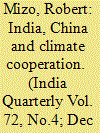

|
|
|
|
|
| Summary/Abstract |
The Paris Agreement on Climate Change was adopted at the close of the 21st Conference of Party on 12 December 2015. This agreement has been approved after a marathon negotiation in which parties under the aegis of the United Nations have finally agreed on the terms and conditions to implement it by 2020. The prime objective of the Paris Agreement is to ensure member states of the United Nations take appropriate and concrete actions in combating the menace of climate change that poses a challenging threat to humanity. It includes keeping temperature rise below 2°C by this century and limiting the temperature increase even further to 1.5°C above the pre-industrial levels. India has announced voluntary pledges during the conference which include carbon intensity growth by 33–35 per cent over the 2005 level, to raise the share of non-fossil fuel power to 40 per cent by 2030 and to produce 175 gigawatt (GW) of renewable power by 2022. Hence, the basic objective of this article is to examine India’s commitments and its initiatives to combat climate change in line with the Paris framework agreement to be implemented by 2020 and also to highlight the implications and drawbacks which India confronted.
|
|
|
|
|
|
|
|
|
|
|
|
|
|
|
|
|
|
|
|
|